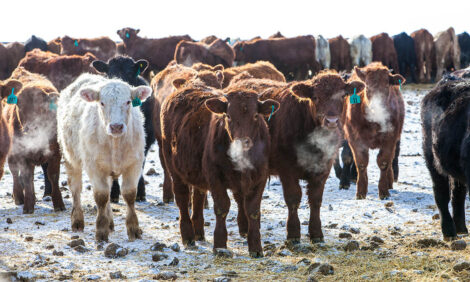



Livestock interest group talks long-term resilience of EU beef sector
In late June, Europe’s BovINE network hosted a public meeting to discuss the sustainability of European beef farming, writes Melanie Epp, who covered the event for The Cattle Site.Throughout the day-long event, a panel of experts highlighted the sector’s challenges and discussed possible solutions. Jean-Pierre Fleury, head of the meat group at Copa-Cogeca, spoke about the position of suckler beef farms in Europe and at the international level.
Copa-Cogeca is the union of the two big agricultural umbrella organizations, COPA and COGECA. Headquartered in the European capital of Brussels, it is also the strongest interest group for European farmers. The organization’s activities focus on the Common Agricultural Policy (CAP), and other areas relevant to farmers, including animal health and welfare, food safety, the environment, trade, and research and innovation.
Fleury, who is also a Charolais breeder, spoke following a talk by André De Gall, a livestock expert from Idele in France. De Gall provided an in-depth look at the French framework for research and development. Following his talk, Fleury offered a similar view, but one that encompassed all of Europe. He was visibly impressed by the French approach to research and development, particularly by the system’s integration and success at information dissemination.
“At the European level, we have a lot of work to do in the years to come, especially in terms of tackling climate change,” he said. “I'm interested in how we respond to criticism and establish the importance of the breeding system and beef cattle systems in Europe.”
There are three main areas of focus if the livestock sector is to overcome this criticism, he said, pointing to livestock’s impact on climate, animal welfare and carbon emissions.
The second is the role of red meat in a diversified diet and the relationship between meat consumption and health. This is an especially important issue today, said Fleury, as the production of meat is in question at the European level in Brussels.
“Advocating for the importance of our sector is important,” he said.
The second topic of importance going forward is animal welfare. And while this is something they are continuously working on, Fleury believes the sector needs to be the one spearheading the issue.
Going forward, Fleury said Copa-Cogeca will focus much of its attention on carbon emissions as well.
“Because our critics are talking about health, about the risk for health when consuming meat, about animals being mistreated, and about the sector producing greenhouse gas emissions,” said Fleury. “And so we have to respond to those critics.”
Livestock production is an essential component to the development of rural areas. It’s an important element for the development of landscape and territories, as well, and for balancing urban development, said Fleury.
“Our activities as breeders help promote biodiversity,” he added.
One of the challenges the sector faces is changing rules under CAP reform. Fleury fears that bureaucrats in Brussels make decisions before hearing the stories of farmers. It’s difficult sometimes, he said, to make themselves heard.
“We are not sure who’s going to win the war on communication,” he said. “ The problem is that policymakers at European level will present a vision that may not match that of the breeders at the local level.”
Food sovereignty is another major topic of concern, especially in times of crisis, as we have seen in recent months. Fleury admitted that he’s worried about the way the CAP reform is being carried out. He questions whether the Farm to Fork model is an efficient enough tool to sustain and support the livestock, and in particular, beef sector.
Another cause for concern going forward is free trade and the importation of sub-standard beef from countries like Brazil. It would be naive to think that free trade would be impeded by climate change going forward, said Fleury.
“I think we are just at the beginning of what we can do in the years to come,” he said. “Because we need to convince Brussels that we cannot go on with this unfair free trade at the global level.”
In addressing these concerns, Fleury had just one suggestion: Simplify the messages. Messaging around health, animal welfare and carbon emissions need to be simple, and efforts need to be amplified, he said. NGOs create their own studies with few sources. To tackle this, Fleury suggested that the sector focus on producing and disseminating its own studies with solid facts.
“Competition is fierce,” he said. “I’m sure we will be successful in the end.”


